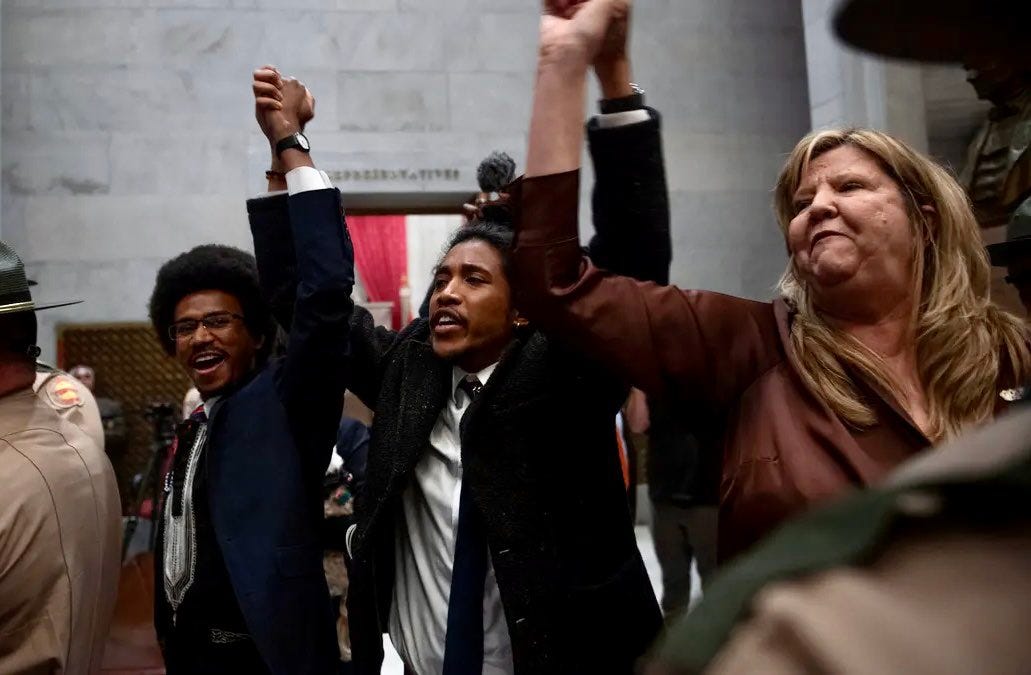Tennessee
In December 1966, the United States Supreme Court unanimously decided a case called Bond v. Floyd. Julian Bond was a Black man elected to the Georgia legislature.
Several months after his election in June 1965, a civil rights organization that Mr. Bond belonged to issued an anti-war statement about Vietnam, which he subsequently endorsed in statements to the press. White members of the Georgia House challenged Bond’s right to be seated, charging that his statements aided our enemies, violated the Selective Service laws, discredited the House, and were inconsistent with the legislator’s mandatory oath to support the Constitution.
Bond filed a challenge in the House to the petitions against seating him, alleging they were violations of his First Amendment rights and they were racially motivated. The House committee hearing his challenge concluded that Bond should not be seated. He filed a lawsuit, and a three-judge panel in the federal district court in Georgia ruled against him 2-1. Bond filed an appeal under a provision that permitted him to go straight to the United States Supreme Court. While the appeal was pending, he was re-elected to the Georgia House in a special election, and, again, the House refused to seat him. He was elected again in the regular election in 1966, and the Supreme Court decided his case shortly afterwards.
The unanimous Supreme Court decision in Bond’s favor relied upon a famous First Amendment case, New York Times v. Sullivan, holding that although a state may impose a requirement that legislators take an oath of allegiance, it cannot limit their capacity to express views on local or national policy. “[D]ebate on public issues should be uninhibited, robust, and wide-open,” the Court wrote, citing the decision in Sullivan.
The Court’s opinion in Bond concluded with these words: “Legislators have an obligation to take positions on controversial political questions so that their constituents can be fully informed by them, and be better able to assess their qualifications for office; also so they may be represented in governmental debates by the person they have elected to represent them. We therefore hold that the disqualification of Bond from membership in the Georgia House because of his statements violated Bond’s right of free expression under the First Amendment.”
The Bond case was about whether a newly elected member should be seated, so it’s not precisely the same situation as what we are seeing in Tennessee today. But the principle is the same: members of the Tennessee legislature do not lose their First Amendment rights by virtue of their election, and especially not when they are seeking to represent the constituents who elected them. A challenge to those members’ First Amendment rights cannot be dressed up as a violation of decorum rules; it’s still a violation of First Amendment rights. And when two Black representatives are expelled while a white one narrowly avoids expulsion, no amount of dissembling can erase the obvious conclusion.

The Supreme Court in Bond held, “[W]hile the State has an interest in requiring its legislators to swear to a belief in constitutional processes of government, surely the oath gives it no interest in limiting its legislators’ capacity to discuss their views of local or national policy. The manifest function of the First Amendment in a representative government requires that legislators be given the widest latitude to express their views on issues of policy.”
Tennessee State Rep. Justin Pearson, who was expelled from the legislature today because he supported his constituents who were concerned about gun violence, said, “You cannot ignore the racial dynamic of what happened today. Two young Black lawmakers get expelled and the one white woman does not?” And of course, he’s right.
What happened in Tennessee on Thursday was outrageous and stupid and petty, and then the legislature went on to advertise their racism. It was also illegal. It shouldn’t take long for the next stage of this to play out in the courts. But that doesn’t excuse the fact that it happened in the first place.
We’re in this together,
Joyce



“There may be times when we are powerless to prevent injustice, but there must never be a time when we fail to protest.” – Elie Wiesel
I’ve been watching this in horror all day but two things give me hope. The ejected representatives are awesome and now have a national platform. I can’t wait to see what they do next. Also, the sea of protesters- a young and diverse group saw the racism and the depravity of the bigoted republicans. They will not forget this. The evil racists won this moment, but I think they wii rue this day.